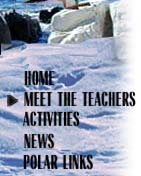
|
|
13 February, 2003
Timing, Luck, and Persistence Yield Ice Time - by Aaron Schlosser
Introduction: I have just spent the last six weeks with a wonderful group of individuals. Many of you have read my interpretations and reflections of Antarctica in this journal. I thought it would be nice to hear from some other people I have had the genuine pleasure to work with here on the Ice. Todayís entry comes from Aaron Schlosser, an undergraduate student, majoring in Education. There is no doubt in my mind that Aaron's wide range of experiences and passion for life will make him a highly valued and respected teacher some day.
Timing, Luck, and Persistence Yield Ice Time - by Aaron Schlosser
The story behind my coming to the Antarctic is one of persistence and luck. The luck came when I overheard a geology professor discussing a need for research assistants in the University of Maineís Antarctic research program. I took note of the names he mentioned in the conversation and after class began contacting them. Once I found out who was in need of a research assistant I began a relentless self-promotion campaign. I contacted Brenda Hall of U-Maineís Quaternaries Institute and introduced myself as her next assistant. I met with Brenda nearly every week showing her my enthusiasm and dedication. She would say that it was this assault of office visits that convinced her I would make a good assistant on the trip, but I like to think it was my charming personality and wit that got me on the team.
Once I found out that I had been chosen for the Dry Valleys expedition I could hardly contain myself. I told everyone I knew and even a few people I didnít. I had a hard time focusing on anything but the trip, and I began to work Antarctica into most of my conversations. For example, my auto mechanic said, ďYeah, you're going to need a new alternator and a voltage regulator.Ē I responded, ďNo, Iím going to Antarctica." Those who knew me understood and appreciated my excitement, while others just looked at me funny and rolled their eyes.
Once I began to meet other team members I realized that not only would I be going to one of the furthest reaches of the Earth, but also I would be doing it with an incredible group of extremely talented scientists and teachers. We met briefly once or twice before the trip and then met at the airport with bags packed. We were on our way.
Upon arrival in McMurdo Base we all went to work gathering the equipment needed to survive and work in the Dry Valleys. We worked well as a team, which made the monumental task of gearing up quick and fun. Before we knew it, we were going through our survival training and boarding the helicopters. The flight out to the Dry Valleys was amazing and I sat wide-eyed, my face pressed to the window for the one-hour flight to our first camp.
The work that we did for the next 5 weeks was hard and at times tedious, but a strong commitment to team work was shared by all, and one persons load was shared by many. When one person was feeling run down or sick, others would help them out or even give them time off to rest and recover. I believe that it was this ethic of teamwork and genuine compassion for our coworkers that made the trip so successful.
My best memory of the trip is of drilling holes on the ice with Mary Ann DeMello and Sean Birkel. We called ourselves the "boring team" and we were the best hole drillers on the expedition. We maximized our efficiency by recognizing each otherís strengths and weaknesses and then working in a manner that cancelled them out. Being the shortest, Mary Ann would turn the drill when it was near the ice, Sean would turn it when it was a about waist level, and being six foot four, I would turn the drill when it was over Mary Annís head. We were able to pace the work perfectly so that no one person got too tired, but there was constant drilling taking place. After a few holes, we worked out a communication system of grunts and nods that allowed us to raise and clean the drill, add extensions, and lower it back into the hole in mere seconds. We started off drilling only three holes a day, but toward the end of the trip nearly doubled this number.
This trip has been one of the best experiences in my life. From the planning stages, to the completion of the fieldwork, Iíve maintained a level of excitement that rivals my first day at school or my first roller coaster ride. I hope to return some day, maybe as an assistant or maybe with my own team. Either way would be fine just as long as I get to come back to Antarctica.

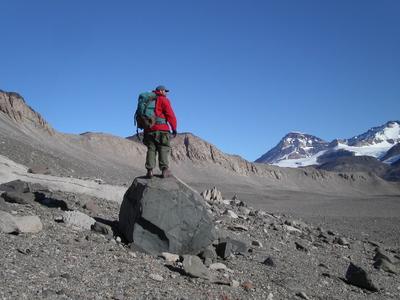
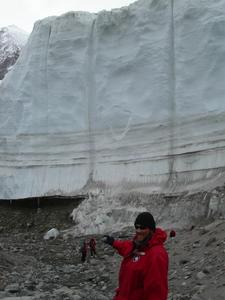
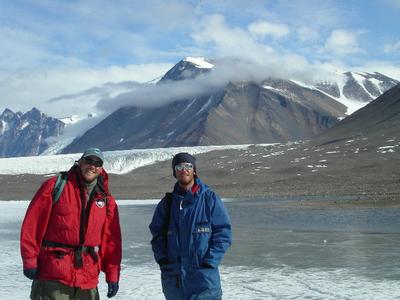
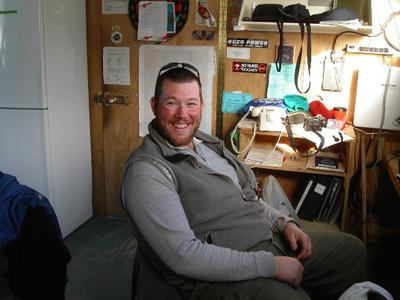
Contact the TEA in the field at
.
If you cannot connect through your browser, copy the
TEA's e-mail address in the "To:" line of
your favorite e-mail package.
|
